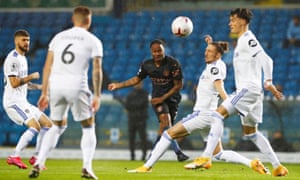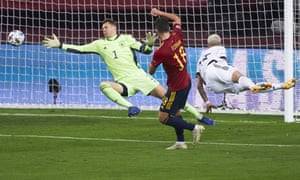[ad_1]
For football, this was the year evolution went backwards. It began with further victories for the high press, with Hansi Flick’s Bayern Munich surging to the Champions League and the Bundesliga, and Jürgen Klopp’s side giving Liverpool their first league title in 30 years, but it ended with a widespread reversion to a more cautious style.
A dozen years ago, Pep Guardiola led the rise of press-and-possess football; recently, the pressing element has come to be prioritised – and then Covid-19 arrived. There are those who will dismissively point out we had pressing in the 80s. And we did – we’ve had it since the 60s – but we also had computers in the 80s, it’s just that they were nowhere near as sophisticated or powerful as they are today.
Modern pressing is relentless and it is finely tuned to adjust to the internal rhythms of the opposition. It demands fit and fresh players but also time on the training field so it can be tweaked game to game. With the truncated pre-season, players are not as fit in this campaign as they usually are. With two games every week, fatigue is an even bigger issue and there simply isn’t time for detailed bespoke preparation.
The result in the early weeks of the season was a wildness. Going into the October international break, when most teams had played four games, the average goals per game in the Premier League was 3.79. Liverpool had lost 7-2 to Aston Villa, Manchester United had lost 6-1 to Tottenham and Manchester City had lost 5-2 to Leicester.
Since then, as teams have begun to settle for a more cautious style of play, goals per game have slipped back to 2.91. The average for the past decade is 2.74, so there is every chance that by the end of the season goals per game will not look especially unusual.

But the way teams are playing has clearly changed. This season each team averages 134.2 pressures per game; in 2018-19 that figure was 173.7. Teams are pressing 22.7% less than they were in the last pre-Covid season. To put that in context, nobody presses more than Leeds this season, but their 164.1 pressures per game is more than only four sides in 2018-19.
As pressing recedes, so an older form of football returns. The goalless draws between Manchester United and Chelsea, Chelsea and Tottenham, United and Manchester City and even the final stages of the 1-1 between City and Liverpool, were a throwback to two decades ago or more, with teams so reluctant to expose themselves to a possible counterattack that in effect nothing happened. (Set against that is any game involving Leeds, who press with abandon whatever the circumstances and so are thrilling and fragile in equal measure.)
In that generally cautious world, coaches whose ideas were previously considered almost extinct re-emerge. Most notable has been José Mourinho, whose Tottenham managed to pick a few pockets before the limitations of their approach became apparent. Even in this regressive environment, hedgehogs, which do one thing well, tend not to be as well-equipped to win titles as foxes, which have a greater range of knowledge.
What is remarkable is how quickly that reversion has come. Even with the three-month shutdown, last season was another triumph for pressing. Liverpool had the title as good as won by the turn of the year and although they never attained the heights in the final weeks of the campaign they had achieved before the break there was no doubting their style or how effective it was.
Liverpool’s slightly freakish elimination by Atlético Madrid in the last 16 meant Klopp wasn’t there, but three other German coaches reached the Champions League semi-finals: Flick, Julian Nagelsmann at RB Leipzig and Thomas Tuchel at PSG. 2019-20 was a season dominated at elite level by the German school of pressing.
The high line makes such an approach a high risk, particularly against teams who are adept on the break, as was seen most clearly in RB Leipzig’s 5-0 defeat at Manchester United. Even Bayern, frequently leaving Manuel Neuer alone in his own half, often seem vulnerable, but the nature of their press is so overwhelming that they are rarely exposed.
That’s the gamble of the style, one that led to the spark between Roy Keane and Klopp after Liverpool’s victory against Arsenal in September.

The other notable feature of last season’s Champions League semi-finals was the absence of a Spanish club for the first time since 2007. Barcelona were obliterated by Bayern, Real Madrid were entirely unable to cope with City and Atlético were dismissed relatively straightforwardly by Leipzig.
The suggestion for a little while had been of a decadence to La Liga, and this seemed confirmation that Spanish sides cannot cope with the physicality of the hard-pressing sides of the Bundesliga and the Premier League.
Which made it all the more striking when Spain beat Germany 6-0 in the Nations League, a game that suggested the continuing excellence of Spanish youth development and the way Joachim Löw, the national manager, has failed to keep pace with the rapid advances in pressing within the German game.
In Italy, meanwhile, where judgments have to be tempered by the richest club by far, Juventus, having invested a fortune in an essentially immobile striker and then handicapped themselves by appointing a novice coach, the triumph of pressing is best seen in the way Atalanta continue to punch above their weight.
It’s not entirely certain pressing will return in quite the same way as the calendar settles down (although that will be a while, given the international tournaments next summer and a winter World Cup in 2022). It may be that teams adopting a more cautious approach find it suits them and that in a world that had become obsessively attacking being able to defend offers a competitive advantage.
But for the moment the game is in a period of curious limbo, responding to the crisis by reverting to an older, simpler form of the game. One route of development has been paused and it’s far from certain where football will go next.
[ad_2]
Source link